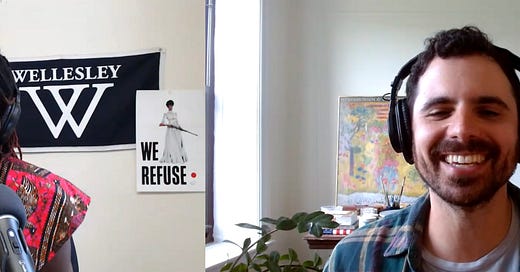It's Not a Period — It's a Kamala
Placing Kamala's candidacy within the broader scope of U.S. history, with Professor Kellie Carter Jackson
In our latest interview about the 2024 election, I welcomed Professor Kellie Carter Jackson back to Skipped History. In past conversations, Professor Carter Jackson and I explored lessons from Black abolitionists and the effectiveness of violent resistance. Both topics came up again as we discussed Professor Carter Jackson’s excitement over Kamala Harris, her concerns if Kamala wins, and how Kamala fits into a longer trajectory of Black women seeking justice. No matter what, Professor Carter Jackson says, “We have not arrived. We’ve only just begun.”
Professor Carter Jackson is the Michael and Denise ‘68 Associate Professor of Africana Studies and the Chair of the Africana Studies Department at Wellesley College. Her essays have been published in The New York Times, The Washington Post, The Atlantic, and a host of other outlets. She’s been featured in numerous documentaries and appeared on numerous news programs. She’s also the award-winning author of Force & Freedom: Black Abolitionists and the Politics of Violence and, most recently, We Refuse: A Forceful History of Black Resistance.
A condensed transcript of our conversation, edited for clarity, is below. You can also listen to the podcast version, which includes Professor Carter Jackson’s thoughts on how unprepared we might be for Trump’s possible return to office, Oprah’s changing politics, parallels between today and Reconstruction, and more:
It's Not a Period — It's a Kamala
Listen now (50 mins) | Audio of my conversation with Professor Carter Jackson
Ben: We haven’t caught up yet about the election. What’s been rattling around your mind over the last couple of months?
KCJ: It’s been a lot. We had my family over for my parents’ 50th anniversary — 80 people in my house. And we were all in the kitchen when Joe Biden announced he was withdrawing. Then, like 30 minutes later, he endorsed Kamala, and it felt like an explosion. Especially among the Black women in the room. Then, I started getting pings about a Black woman Zoom, like we were rallying already. I was still digesting it all.
I have to say, I was surprised at my own change of opinion. When Kamala first ran in 2019–2020, I was kind of lukewarm. There was such a big pool of candidates then. Now, I’ve never been more excited. It’s crazy that three out of the last four Democratic nominees have been a Black man, a white woman, and a Black woman. That’s unheard of. It’s meaningful to me.
I study the enslaved, looking at death dates and whether they lived to see freedom or certain progressive moments in history. I’ve been wondering what they’d think of today’s world. Would they be overwhelmed? Would they think it’s incredible?
Ben: I’ve been thinking about the same, especially when looking back at your work. How do you see Kamala Harris fitting into the broader trajectory of Black women and resistance?
KCJ: She fits right in, in a way I don’t think anyone expected. We’ve always seen Black women on the front lines — from the abolitionist movement to the women’s suffrage movement, with figures like Ida B. Wells, Harriet Tubman, and Sojourner Truth. Black women have worked tirelessly to create a more just and equitable world for everyone. Kamala’s picking up that torch, and I see her as part of that longer line of struggle.
Of course, historians won’t fully assess her legacy until later, but it’s a big moment, whether Trump or Kamala wins. And no matter who wins, we can’t stop fighting. The hardest part of a revolution isn’t achieving it — it’s sustaining it.
Ben: Do you see risks if Kamala wins, similar to the backlash we saw after Obama’s election?
KCJ: Yes. Professor Brittany Cooper talks about this — whenever there’s racial or gender progress, there’s always a violent response. Black Lives Matter was founded during Obama’s presidency because unarmed Black men and women were still being killed.
If Kamala wins, we should prepare for a backlash, especially against Black women and women of color and women in general. We saw it with Hillary — even though she lost, Roe v. Wade was rolled back, and women’s reproductive rights were attacked. History shows us that progress triggers violent resistance — the Klan, for example, was born out of Reconstruction, out of Black political and social empowerment. So, we can’t get comfortable at all. We have to be sober about what progress brings out in its adversaries.





